Reviewed by Glenn Erickson
Universal was pretty kind to horror and Sci-fi fans three years ago, with their Classic Monsters Blu-ray set containing a fistful of top '30s titles plus The Creature from the Black Lagoon in 3-D. Naturally, all of us ungrateful and impatient fans wanted more. Was more forthcoming? No. I ask you, is this what we want to see happen in a free society?
Well, we're privileged to live in a society free enough to allow us to make the video equivalent of a Run for the Border. Universal may be putting its old movies on cable TV in HD somewhere (somebody send them to Time-Warner) but at the moment the only game in town is to go to Germany, where a few Universal sci-fi titles from the 1950s have surfaced on Region B Blu-ray. I've seen Monolith Monsters, which looks incredible, and even The Mole People suddenly turns into an almost-watchable feast of moody B&W. And I sprang for Koch Media's Region B of Tarantula, which I reviewed last month, even though it came out a year ago. There's something about the combination of music and bizarre images in these '50s Universal pix that makes them viewable even after you can no longer count how many times you've seen them.
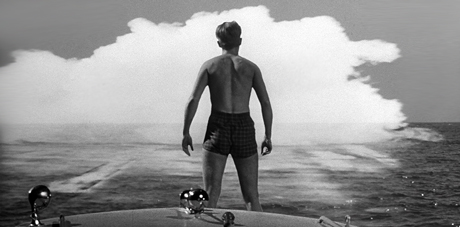
Father's Day loosened the Savant purse strings for another import from the land of Goethe und Schiller, the spine-chilling treat you all know and love as Die unglaubliche Geschichte des Mr. C. Universal's best science fiction film ever looks incredible on Blu-ray.
Coming late in the cycle, The Incredible Shrinking Man followed the studio's Gill Man sequels and imitations of earlier hits. Specialist producer William Alland eventually jumped ship to Paramount, leaving the wildcat producer Albert Zugsmith to accept this assignment. Sci-Fi specialist Jack Arnold wanted out of the rubber monster game, but may have signed on when he saw the intelligent script, or perhaps the bigger budget allotted for the project. Or maybe Arnold just wanted to keep working.
Zugsmith had recently had a solid hit with Douglas Sirk's star-studded Written on the Wind and was making more Universal pictures with name actors like Jeff Chandler. He obtained Richard Matheson's creepy novel The Shrinking Man and decided it would be perfect for an offbeat Science Fiction tale. Either somebody had imagination or the thing was green-lit during vacation time, because Zugsmith's The Incredible Shrinking Man outdoes all of William Alland's Sci-Fi efforts. Kids loved the miniaturization effects, a concept seen mostly in comedy fantasies since the failure of Paramount's Dr. Cyclops back in 1940. Matheson's adult, thoughtful script crystallizes Cold War phobias much as had the previous year's Invasion of the Body Snatchers. What might have been a shaggy-dog story with an unsatisfying twist ending is a wondrous delight. The Incredible Shrinking Man is Science Fiction poetry and the most profound Sci-Fi film of the fifties.
Los Angeles. Ad writer Robert Scott Carey (Grant Williams) notices that he's gradually losing both height and weight. He consults Drs. Bramson and Silver (William Schallert & Raymond Bailey), who are at first baffled. Like a reverse cancer, Carey's tissues and organs -- everything -- are shrinking by a fraction of an inch a day. The specialists soon formulate a theory of what happened and work tirelessly to stop the shrinking process. Scott must hide like a freak and retire from the world. To earn a living, he sells his story to the press. Eventually shrunken so small that he can live in a doll's house, Scott is irritable with his long-suffering wife Louise (Randy Stuart). He's still shrinking with no end in sight -- until the cat, long banished from the house, sneaks back in�
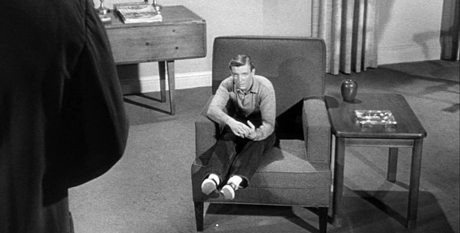
The older Gothic tradition conceives of its horrors in terms of suffering and death, or the loss of one's soul to bestiality or the Devil. The new fears of the Cold War 1950s unleashed an existential crisis into the public psyche. The most famous 'intelligent' 50s Sci-Fi thriller Invasion of the Body Snatchers is about depersonalization and the loss of identity. It encouraged audiences to accept the idea that things aren't what they seem, that the world we see might be some kind of vast political conspiracy.
The Incredible Shrinking Man exploits a different, complimentary fear of the new post-atomic world, a world in which common values, facts and assumptions may be completely transformed. Scott Carey must come to grips with an imminent and implacable fate. It may destroy his life and render it meaningless as well.
There is a classic kind of character that discovers his true nature by losing or casting off artificial and material things; many philosophies religions tell us that this is a path to spiritual grace. Carey goes through a similar process except that his is an involuntary ordeal. As he shrinks bit by bit toward that inescapable zero of personal oblivion, Carey loses everything by which he defines himself. First his clothes don't fit. Then his wedding ring falls off. The doctors concentrate on Scott's biological problem but nobody knows how to deal with his mental state. Scott's wife must mother him like a child. Man becomes toy, husband a helpless baby.
Matheson's original novella emphasized Carey's sexual trauma as he realizes that he's no longer going to be intimate with his wife, and that she soon will need to find someone else. His resentment grows with the forced isolation. He knows that his personality is changing along with his situation. He can't help it.
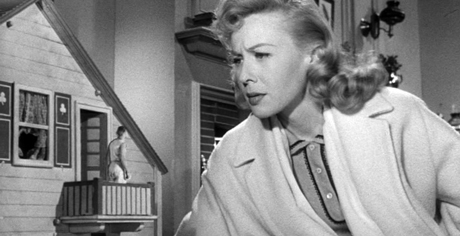
Normally a 1957 movie would have to ignore this sex angle. The Incredible Shrinking Man carefully keeps it at the forefront. Tiny Scott shouts at his wife and demands that she come straight home from the store. Nothing she does is good enough. He's trying too hard to retain his dominance, as when he 'ordered' Louise to bring him a beer as part of their conventionally equitable relationship. Scott at first looks like a little kid in his jeans and tennis shoes, sitting on a chair with his feet barely reaching the end of the cushion. Having a sex drive with such a small body must seem like a horrible joke, a castration nightmare out of Jim Thompson's The Nothing Man.
At one point Carey wanders out to the carnival. He meets a young midget (April Kent) and begs for her company, seeking the security any kind of 'normalcy' can give him. A good husband becomes both abusive and unfaithful, but Carey has no psychological choice -- he's desperate to maintain his identity as a man. But then the shrinking re-commences. Carey doesn't know it yet, but his only certainty is eternal change, and utter isolation in the knowledge that his fate must ultimately be faced alone. Already withdrawn from his normal suburban existence, Scott is drifting into neurosis when events plunge him into a miniature Robinson Crusoe world.
The horrors in Scott Carey's cellar express a chaos beyond simple disproportion; the ordinary, mundane environment of Carey's own basement has turned hostile. The Incredible Shrinking Man in this way resembles Alice Through the Looking Glass in its surreal re-ordering of existing reality. Alice's dream terrors came from nursery rhymes; Carey's emerge from the pages of pulp fantasy, in the form of a horrendously real spider. Scott rallies his strength by flexing an instinct built into the human race, the Territorial Imperative. If one busies one's self with the immediate problems of survival, the Big Unknowns can be staved off a little longer. How else has the human race survived so long? To battle the spider menace Carey summons resources he never knew he had.
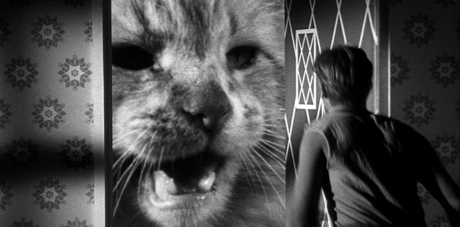
The Incredible Shrinking Man pulls out its ace with an ethereal conclusion that reportedly was not written by Matheson and was added against his wishes. Some philosophies teach that truth can only be found by casting off one's ego, by embracing a natural order larger than the Self. The truth, it is suggested, is incomprehensible to the material-bound consciousness, stuck in worldly realities. Only a fraction of an inch tall, Scott cab now walk through a barrier that previously locked him into the basement. Nothing in his world will ever be the same, unless other 'incredible' men follow his trail into the unknown. But he looks up at the sky and experiences a revelation: the stars are immeasurably distant, yet they haven't changed at all.
I've been at screenings of this film in which one could feel an "ahh" rise from the audience when the camera pulls back on Carey's words, "And I felt myself melting ..." Many people, especially kids that might never have considered the possibility of transcendence, can feel the pull on some part of their minds. As Scott continues with his final speech, The Incredible Shrinking Man achieves what might be the most profound "Sense of Wonder" in Science Fiction. Scott's concluding revelation is sometimes interpreted as a mystic surrender to fate, or even an expression of the death experience. It's really a triumph over complacent existence. With the simple defiant words, "I Still Exist", Robert Scott Carey becomes a hero of the Atomic Age. 1
When I first wrote about The Incredible Shrinking Man in 1981 it seemed to me that Scott Carey's battle with the spider was one of the best special effects sequences ever made. It's still good but modern fans will have no trouble picking apart the perspective tricks, split screens and traveling mattes. One wishes all the original optical elements existed so the shots could be re-composited more perfectly -- shadows for the tiny Scott, etc. But the narrative imagination in Matheson's script makes 'perfect' effects unnecessary. The Shrinking Man works because of the little observations, like Scott's wedding ring dropping off just as he and Louise are affirming their unbreakable union. It hits exactly the right note.
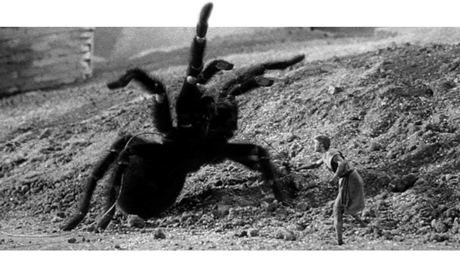
The brilliant aspect that is hard to believe ever made it through the script stage, is the story's bad-news ending. In practically every other show of this kind (especially today), the doctors find the antidote and the story fades out with the situation solved. Think of Outbreak, where a simple injection stops a deadly virus and magically repairs organ and tissue damage! Once Scott falls into the cellar and becomes part of the alternate miniature underworld, he's never heard from again. Louise thinks she's a widow and never learns the truth. At the ¾ mark the housewife leaves the house in a car and never comes back. Never. That's a kind of death, the end of a loving relationship. The Incredible Shrinking Man deals with the infinite and finality. 2
The source of Scott's trouble is at first a mystery and then a theory. It finally becomes irrelevant. The film's first potent image is a man alone facing an approaching 'mystery cloud.' There's no escaping the cloud; all one can do is watch it overtake the boat. Radioactivity must have accounted for twenty 'atomic movie monsters' in the years around this film but The Incredible Shrinking Man makes it into a footnote, prophetically combined with ordinary pesticide. The fantastic nature of the story is not harmed by the utter absurdity of the film's supposed science. For Scott to shrink so perfectly his cells would have to shrink proportionately, not just diminish. And how do hard bones get smaller -- once formed, they're largely inert. Scott's plight is better off left as a philosophical enigma.
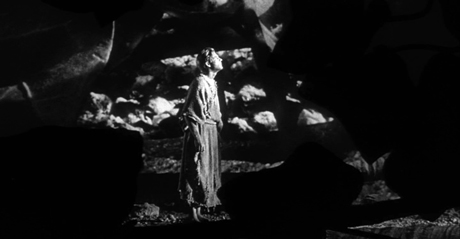
Koch Media GmbH's Region B Blu-ray of The Incredible Shrinking Man is a dazzling widescreen transfer of this great movie. The contrast is excellent, showing the great care taken with the cinematography and the many special sets and props. I love the 'wood grain' carved into boards that Carey must climb in his basement sanctuary. So much imagination is applied to the show that things that aren't perfect don't matter at all. Shrinking Man obviously had a much larger budget than anything William Alland produced. The Universal crafts departments seem to be working harder than ever to produce excellent illusions. 3
The improved detail does make more visible the fluctuating mattes used to composite the tiny Scott into miniature photography. Old videos tended to mask the flaws; they really don't make a difference either. If you haven't seen the old DVD from 2005, you'll be knocked out to finally see this show in its proper widescreen ratio. Older TV prints pan-scanned the image.
The German menus aren't difficult to figure out, to select the English track and subs if desired. The audio on this show has always been strong, with Ray Anthony's trumpet making a clarion call of the main theme. We hear a smattering of Written on the Wind-ish soap opera music on Scott's radio, making his shut-in home life seem even more drab. As an extra, we're offered the Saul Bass-like teaser trailer with Orson Welles introducing Shrinking Man -- it doesn't even use scenes from the movie. With Welles reading the narration, we'll believe anything can happen. A longer trailer is included, but its quality is pretty bad. The image gallery has 95 items, including every still one remembers from old issues of Famous Monsters.
Jack Arnold appears in a ten-minute interview conducted by a German crew, possibly in the late 1980s. Arnold answers technical questions in a very casual way, explaining the effects in rather condescending terms. The way he attributes the special effects to "I" and "we" when he should say, "the effects crew," is a little annoying. Arnold surely helped design the effects and did a great job assessing dailies, but I'd be very surprised if he sat up all night with the lowly spider wranglers, figuring out how to get the arachnid to do what was wanted. He'd have needed a translator to direct those scenes anyway, as he identifies the spider used as an oversize Panamanian variety.
One last time, because I don't want to steer anyone wrong -- this is a Region B disc, and won't play in domestic Blu-ray players.
On a scale of Excellent, Good, Fair, and Poor,
The Incredible Shrinking Man Region B Blu-ray
rates:
Movie: Excellent
Video: Excellent
Sound: Excellent
Supplements: Interview with Jack Arnold, trailer, teaser, stills and artwork gallery, 8mm digest version.
Deaf and Hearing-impaired Friendly?
YES; Subtitles: English, German
Packaging: Keep case
Reviewed: June 21, 2015
Footnotes:
1. Another movie from 1957 is about a woman of modest means, set in her ways, not too bright but with a good heart. Cheated and robbed, she loses her house, her possessions and her money, until at the end she's walking along with nothing, a total pauper. All her material possessions are gone. In the last shot she looks at us and smiles. She's still there, she hasn't changed. Some human essence in her cannot be taken away. The woman breaks the barrier between the filmed story and the audience, and looks right at the camera, right into us. The movie is Federico Fellini's best, The Nights of Cabiria, and it practically parallels The Incredible Shrinking Man.
Return
2. Many acid-rock & "ethereal cereal" lyrics sound faintly ridiculous now, even much of the feel-good mellow vibes of The Moody Blues. Their space-themed album To Our Children's Children's Children obviously riffs on 2001 to revisit older Sci-Fi ideas. The lyric "You've Got to Take the Journey Out and In" seems connected to The Incredible Shrinking Man's idea of infinity, where "the impossibly big and the impossibly small meet like the closing of a gigantic circle." In other words, it's all in your heads, pilgrims. If you want go to the stars, you have to come to terms with the secrets of the atom. If you want to embrace the universe, you must also look deep inside yourself. Pass it this way, please.
Return
3. At a 1973 screening at the Los Angeles County Museum, author Richard Matheson practically apologized for the movie, telling the audience he hated its altered ending. Much later, he reportedly saw it again and changed his mind. At that screening Savant remembers distinctly seeing a "SuperScope" logo on the film. 1958 was a big year for flat movies to be reformatted in SuperScope to yield higher rentals from exhibitors; it's already been established that this was done to the Harryhausen film 20 Million Miles to Earth. Did the SuperScope people do a few test conversions for other studios, too?
As borne out by German press kit materials in this disc's art gallery, it looks as if the movie indeed was converted to CinemaScope for the German market. Or did somebody goof and slap on the wrong logo?
Return

Text © Copyright 2015 Glenn Erickson
See more exclusive reviews on the Savant Main Page.
The version of this review on the Savant main site has additional images, footnotes and credits information, and may be updated and annotated with reader input and graphics.
Return to Top of Page
|

